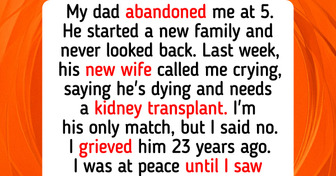Husband the AH thinking to steal from his stepson to fund the younger ones future education. That money was left for OPs oldest and under her supervision until he's an adult, has nothing to do with the other child. Talk to lawyer about options for divorce or get counseling because he has no right try and steal the money for the other
I Refused to Split My Son’s Inheritance With My Other Son

Financial matters often spark conflict within families, with tensions running especially high in blended households. Harper faced a difficult dilemma when her eldest son, from her previous marriage, was due to inherit a significant amount from his late father. Her current husband, however, argued that a portion of this inheritance should be allocated to his own son.
When Harper firmly opposed this idea, the disagreement intensified. Overwhelmed by the situation, she decided to share her experience and seek guidance on managing this delicate issue.
This is Harper’s letter:

You did very right , your son money is his right alone , your husband does not deserve you , if i was you , i would care less . stay strong
Hi Harper,
Thank you for trusting us with your story. We’ve put together some thoughtful advice to help guide you through this challenging situation.
Get legal help.
Since your husband has taken your 12-year-old son without your consent, this situation may constitute custody interference or even parental kidnapping, depending on the laws in your jurisdiction. It’s crucial to consult a family lawyer as soon as possible to understand your legal rights and the appropriate steps to take. Your son’s safety and well-being should remain your top priority.
A lawyer can also assist in mediating custody arrangements to prevent similar actions from occurring in the future. They can help establish clear boundaries and agreements regarding financial matters, such as the handling of the $300,000 inheritance, ensuring that decisions are made in the best interest of all involved.
Talk openly and calmly with your husband.
Once you locate your husband and son, consider arranging a private, face-to-face meeting in a neutral and secure location, ideally with the support of a mediator or counselor. Approach the conversation with a focus on understanding his perspective, making an effort to remain calm and non-defensive.
Take the opportunity to explain the legal and ethical responsibilities surrounding the $300,000 inheritance and why you believed it was essential to uphold those obligations. At the same time, acknowledge his emotions and concerns, and explore ways to collaboratively create a financial plan that supports both children while respecting legal and moral boundaries. Open and honest communication will be key to restoring trust and finding a resolution that works for everyone.
Evaluate your family’s finances.
Your husband’s frustration may be rooted in a concern that the younger son’s needs are being overlooked. To address this, consider exploring alternative ways to support his education expenses. Could adjustments be made to your household budget to allocate funds for his schooling? Are there scholarships, grants, or educational assistance programs that could help cover the costs?
By actively seeking solutions for your younger son’s education, you can demonstrate fairness and a commitment to his future while still honoring the intended purpose of the inheritance. Taking this approach may help foster mutual understanding and cooperation within your family.
Pursue family counseling to heal.
This incident has likely caused emotional strain on your family, especially in your relationships with your husband and younger son. Seeking family counseling could offer a safe and constructive environment to address feelings of resentment, inequality, and misunderstanding.
A trained therapist can facilitate conversations that help each family member express their feelings and understand one another’s perspectives. They can also guide you in developing strategies to rebuild trust and foster cooperation within the family. This support will be particularly valuable in ensuring that your younger son feels valued and cared for as you navigate these challenges together.
Angelica was devastated to learn that her ex-husband had been diverting their child’s college fund to support his stepdaughter. Refusing to let this injustice go unnoticed, she decided to take action. What she uncovered in the process was a shocking revelation that would change everything. Discover the full story of her courageous journey here.
Comments
Hi, You do not say whether your elder son has completed his college education and whether your younger son's father contributed to this. A quid pro quo would seem reasonable if your younger son's father did this.
Related Reads
I Stopped Picking Up Job Calls on Weekends—Now HR Is Rethinking Their Policy

16 Touching Stories That Capture the Chaos and Beauty of Blended Families

12 Moment That Show Kindness Is the Glue That Keeps the World From Breaking Apart

13 Double-Life Stories That Prove Even Those Closest to Us Have Secrets

I Refuse to Save the Father Who Abandoned Me—Now Everyone Calls Me Heartless

15 Heart-Centered Moments of Human Kindness That Only Happen Once in a Blue Moon

23 Times Quiet Kindness Won Over Human Ignorance in the Best Way

I Refused to Follow My Boss’s Dress Code—HR Had to Step In

12 Heart-Touching Moments That Remind Us Workplace Loyalty and Empathy Don’t Pay the Bills

I Refuse to Talk to My Friends After They Tricked Me Into Eating Meat—I’m Vegan

I Refused to Be a Free Hotel for My Late Son’s Family: They Eclipsed My Life

18 Stories That Prove Living in an Apartment Is Like Having a Front-Row Seat to a Comedy Show




